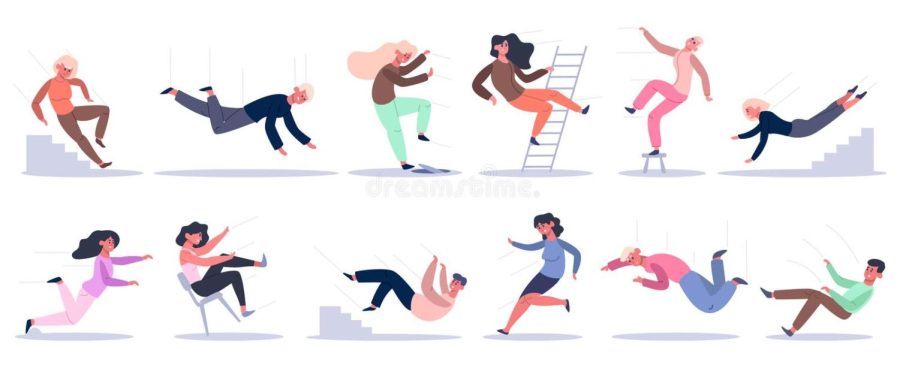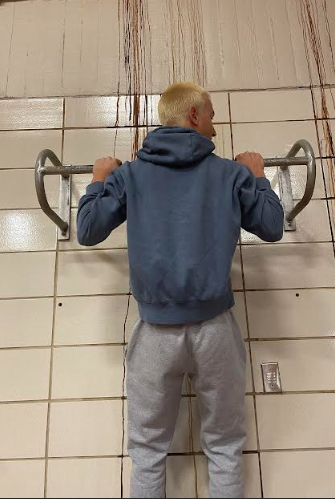High School’s Ups and DOWNs!
If you were to fall in the hall, would you get help?
Being a good person is not hard, but it doesn’t just happen. Many can do things for people without regret. We inevitably fall into a reciprocity trap when we do things for others. Think about what we learned back in elementary school. Saying thank you when others helped you is a must. This burns into our consciousness so much that every time appreciation skips us, we feel cheated. But when it comes to being a good samaritan, people often turn a blind eye to others in need. As much as anything else, you have to want to be a good person and make choices that correspond with your beliefs.
As students enter high school, it can be a mosh-pit of people walking up down the hallways. It is filled with many people of different outlooks, beliefs and values. You never know who is around you, which raises a concern for some: if I were to take a stumble in the middle of this hallway, would someone help me?
To test this, senior Louis Bohlen fell in the middle of the hallway one day after class. The hallways as soon as class gets out are filled with people walking in different directions. It becomes crowded and it’s overwhelming as you don’t even want to run into anyone.
Before I had Louis fall I asked him what his prediction would be about how others would react.
“I think there could be someone that would help me, but there could be a lot of kids who walk around me and laugh, ” said Bohlen.
Olivia Bateman who was standing nearby thought differently.
“I really think someone could help Louis up, I know I would,” said Bateman
The results to many were shocking to say the least. Since Bohlen was left on the floor to pick up his own papers and binders. Kids who were passing by took a quick glance and kept moving on. The majority did even look up from their phones to acknowledge his fall.
Following the fall Bohlen was not shocked himself with the results of what happened.
“I knew the moment I fell that everyone who was surrounding me did not want to help me up,” said Bohlen.
In the study, Darley, J. M., and Batson, C.D., “From Jerusalem to Jericho”: A study of Situational and Dispositional Variables in Helping Behavior”, it was to experiment the likelihood of a good samaritan. Previous studies have failed to find a link between personality traits and the likelihood of helping others in an emergency. However, changes in the number of people present did have a big effect on behavior.
The researchers had three hypotheses, one of them being: People in a hurry will be less likely to offer aid than others. This was tested by having a man slumped in an alleyway, and seeing if anyone would help this man up on their way to a task. Ironically, a person in a hurry is less likely to help people, even if he is going to speak on the parable of the Good Samaritan. (Some literally stepped over the victim on their way to the next building!).
The results seem to show that thinking about norms does not imply that one will act on them. Maybe that “ethics become a luxury as the speed of our daily lives increases’ ‘. Or maybe people’s cognition was narrowed by the hurriedness and they failed to make the immediate connection of an emergency.
Many subjects who did not stop did appear aroused and anxious when they arrived at the second site. They were in a conflict between helping the victim and meeting the needs of the experimenter. Conflict rather than callousness can explain the failure to stop.
This study is not the only study and reasoning into why people dont help you when you fall, get into an accident and not call 911, or say they did it first so it’s okay for me to not do so either.
Triton psychology teacher, Jill Lewis when asked, “Do you think anyone would help you up after you were to fall?”. Her response was,
“I do not believe anyone would help because of a few different ideas and concepts that are talked about in social psychology such as diffusion of responsibility and bystander effect”.
The diffusion of responsibility is the tendency for individuals to fail to take responsibility for something (actions or inactions) because of the presence of others who “share” responsibility. Whereas the bystander effect is The effect that the presence of other people has on the decision you make to help or not help someone else. The more people that are around, the less likely it is that you will help.
We can see this proven as Bohlen fell, no one was willing to help and completely walked around him. Many say they would have helped or been some sort of support but many would have done exactly what happened. If you were to watch someone in the hall would you help them up?

Hi! My name is Channing Marengi. I’m a senior at Triton High School. I play field hockey here at Triton. Outside of school I love to hang out with my...





